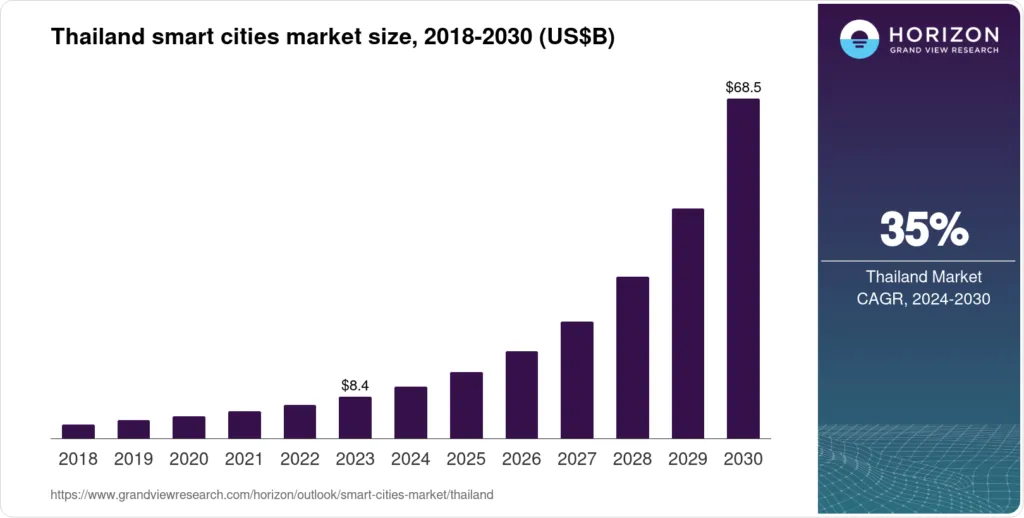Thailand is taking significant strides in building smart cities to address urbanization challenges and drive economic growth. With the growing demand for advanced infrastructure, Thailand Smart City Projects are becoming a cornerstone of the country’s development strategy. The Thai government, private sector, and foreign investments are working together to create efficient, sustainable, and technology-driven urban areas.
The Growing Market of Thailand Smart City Projects

Thailand’s smart city market is on the rise, expected to grow at a Compound Annual Growth Rate (CAGR) of 13.2% from 2023 to 2029. This growth is fueled by substantial investments and strategic government support. The establishment of 36 smart cities across 25 provinces as of 2023 is evidence of Thailand’s commitment to transforming urban landscapes.
Read Also: Thailand Real Estate Trends: The Growth You Can’t Ignore
Government Initiatives and Funding
The Thai government has set ambitious goals, including the development of 100 smart cities by 2040. Policies like the “Smart City Development Plan” and “Thailand 4.0” are designed to accelerate urban transformation. Key Thailand Smart City Projects, such as the $37 billion smart city initiative in Chonburi, aim to integrate clean energy, advanced technologies, and improved residential and business centers. This project is expected to be completed by 2032 and will serve as a model for other smart cities.
Eastern Economic Corridor (EEC): A Hub for Investments
The Eastern Economic Corridor (EEC) is central to Thailand’s smart city plans. The region has attracted investments worth $6.43 billion, representing 56% of the total investment value in Thailand. The EEC focuses on developing technology-driven cities to improve transportation, energy efficiency, and public services.
Thailand Smart City Projects: Meeting Urban Population Needs
By 2050, 72% of Thailand’s population is projected to live in urban areas, up from 50% in 2021. This rapid urbanization highlights the need for smarter infrastructure to manage housing, transportation, and environmental challenges. Smart cities address these needs by leveraging technologies like IoT (Internet of Things) and big data to monitor traffic, reduce pollution, and improve quality of life.
Read Also: The Hidden Growth of Urbanization and Construction Thailand
Smart City Promotion Zones: A Nationwide Expansion
In 2023, Thailand approved 144 smart city promotion zones across 54 provinces. These zones are designated areas for smart city development, providing local governments with resources to implement sustainable infrastructure projects. This rapid growth underscores strong government backing and local enthusiasm for smart city solutions.
Smart Mobility and Clean Energy Initiatives with Thailand Smart City Projects
Transportation plays a significant role in Thailand’s smart city projects. The government has allocated $606 million for smart mobility projects in over 30 cities. This includes the development of public transportation systems like the Hat Yai monorail project, expected to be completed by 2027. Clean energy solutions are also central to these initiatives, aiming to reduce carbon emissions and improve air quality.
The Economic Impact of Thailand Smart City Projects
Thailand Smart City Projects contribute significantly to economic growth by creating new business opportunities, jobs, and technology-driven industries. The combination of clean energy, sustainable design, and smart infrastructure makes Thailand an attractive destination for foreign investments. Initiatives like the Chonburi smart city demonstrate how modern cities can balance growth and sustainability.
Thailand Smart City Projects are paving the way for a future of sustainable urbanization and economic development. By integrating cutting-edge technologies, strategic investments, and ambitious policies, Thailand is set to become a regional leader in smart urban infrastructure. These initiatives address pressing urban challenges while offering opportunities for long-term growth and innovation.







